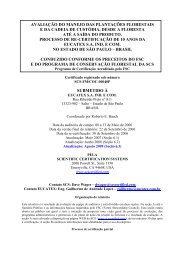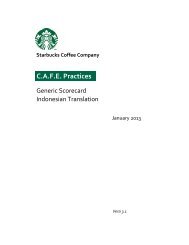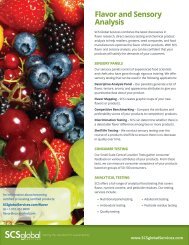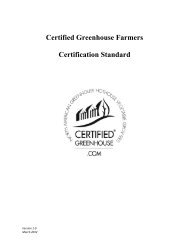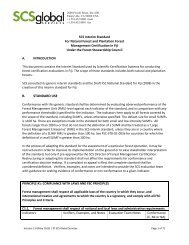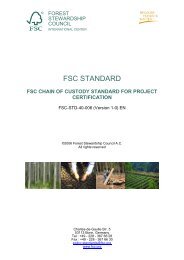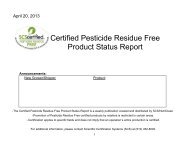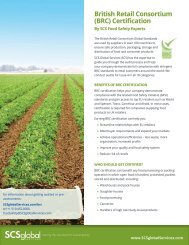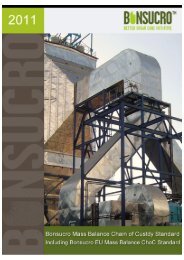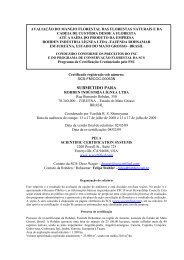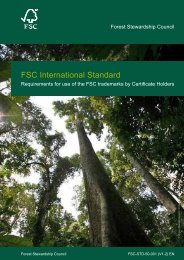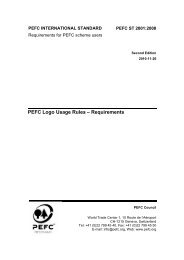Standard - SCS Global Services
Standard - SCS Global Services
Standard - SCS Global Services
You also want an ePaper? Increase the reach of your titles
YUMPU automatically turns print PDFs into web optimized ePapers that Google loves.
<strong>Standard</strong>Reference No.Compliance No. Compliance Criteria Time(Year of Evaluation)MajorES-IPM 2 ES-IPM 2.1 Registered smallholders are able to demonstrate that agrochemicals are applied based on knowledge of pests anddiseases.6AC AgrochemicalsES-AC 1ES-AC 1.1The Market Access Partner compiles a list of the agrochemicals that are used for agricultural production that isincluded in the Fair Trade certificate.0ES-AC 1.2The list indicates which of those materials are on the Fair Trade USA Prohibited Materials List (PML) part 1 (Red List)and part 2 (Amber List).0ES-AC 2ES-AC 3ES-AC 1.3 The list is updated every three years, at minimum. 3ES-AC 2.1 Materials on the Fair Trade USA PML part 1 (Red List) are not used on Fair Trade crops. 0 MES-AC 2.2 The Market Access Partner implements measures to raise awareness of the PML among members. 3ES-AC 2.3 Awareness raising measures are documented and records are kept on file. 3ES-AC 2.4 Prohibited materials are clearly marked “not for use on Fair Trade crops”. 0ES-AC 3.1 The chemical storage area is locked and accessible only to trained and authorized personnel. 0ES-AC 3.2 The storage area is ventilated to avoid a concentration of toxic vapors. 0ES-AC 3.3 The storage area has the equipment necessary to handle accidents and spills, including absorbent materials. 0ES-AC 3.4 The storage area does not contain food. 0ES-AC 3.5 Hazardous materials are clearly labeled. Labels indicate contents, warnings, and intended uses. 0ES-AC 3.6 Information is available regarding the safe handling of hazardous materials (Material Safety Data Sheets). 00ES-AC 4 ES-AC 4.1 Agrochemical containers are not reused to store or transport food or water. 0ES-AC 5 ES-AC 5.1 The Market Access Partner provides training to members and workers who handle agrochemicals on the risks ofhandling these materials and on how to handle them properly.The training should address the following subjects, as appropriate:• How to store hazardous chemicals safely, ensuring that they cannot be reached by children.• How to understand the product label and other safety instructions for use made available by the manufacturer.• Container labels should indicate contents, warnings, and intended uses.• How to handle accidents and spills when preparing and applying chemicals.1• How to handle and safely dispose of empty containers, including the practices of triple rinsing and puncturingcontainers.• Intervals of time when people are not allowed to enter a sprayed area or field without any personal protectionequipment.ES-AC 5 ES-AC 5.2 The majority of the registered smallholders attend. These trainings are documented; records are kept on file. 1ES-AC 6 ES-AC 6.1 The Market Access Partner implements measures to ensure that all people, including registered smallholders andworkers, wear effective personal protective equipment (PPE) when handling pesticides or hazardous chemicals. 1ES-AC 7ES-AC 7.1The Market Access Partner continues to raise awareness among all members and workers of the hazards and risksrelated to agrochemicals, i.e. through a presentation, information material, or trainings.3ES-AC 7.2 Awareness raising measures are documented; records are kept on file. 6FTUSA_STN_ISS Criteria_V1‐1_020113 Page 16



